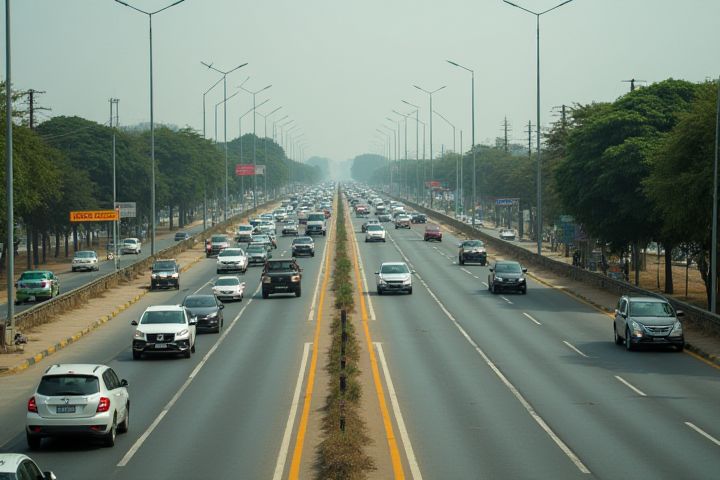
Road networks in Nigeria encompass over 200,000 kilometers, forming a critical component of the nation's infrastructure. The road system consists of federal, state, and local roads, facilitating transportation across diverse terrains, from urban centers to rural communities. Major highways like the Lagos-Ibadan Expressway and Abuja-Kaduna Expressway are vital for economic activities, connecting strategic locations and promoting trade. Challenges such as poor maintenance and congestion affect the efficiency of these routes, highlighting the need for investment in infrastructure upgrades. Enhancing road safety measures and ensuring proper signage are essential for improving travel experiences and reducing accidents on Nigerian roads.
Extensive federal road system
Nigeria's extensive federal road system encompasses over 36,000 kilometers of major highways, connecting states and facilitating trade. The road network plays a crucial role in the nation's economy, as it supports the movement of goods and services, linking urban and rural areas. Major routes, such as the Lagos-Ibadan Expressway, are vital for transportation efficiency, reducing travel time between commercial hubs. You can explore the ongoing improvements and upgrades aimed at enhancing road safety and connectivity throughout the country.
Key north-south and east-west highways
Road networks in Nigeria are primarily designed around key north-south and east-west highways, facilitating efficient transportation across the country. Notable routes include the Lagos-Ibadan Expressway, which connects major economic hubs and supports commercial activities. The Enugu-Port Harcourt Road enhances accessibility to the southeastern region, playing a vital role in regional trade. In addition to connecting cities, these highways are crucial for the movement of goods, agriculture products, and commuters, contributing to economic growth and development in Nigeria.
Poor road maintenance
Nigeria's road networks suffer from inadequate maintenance, leading to deteriorating infrastructure that hampers efficient transportation. Frequent potholes and uneven surfaces pose risks to vehicles and contribute to traffic congestion, significantly impacting travel times. Poorly maintained roads can also adversely affect local economies, limiting access to markets and services for communities. Investment in regular maintenance and upgrades is essential to improve road safety and support sustainable development in the region.
High traffic congestion
High traffic congestion characterizes major road networks in Nigeria, particularly in densely populated urban areas like Lagos and Abuja. These congested roads often suffer from poor infrastructure, limited public transport options, and inadequate traffic management systems. Consequently, commuting times can extend significantly, affecting both economic productivity and quality of life for residents. Addressing these issues requires comprehensive planning, investment in road maintenance, and the development of integrated transportation solutions to ease congestion effectively.
Frequent road accidents
Frequent road accidents in Nigeria severely impact the country's road networks, contributing to significant loss of life and economic strain. Poor infrastructure, including potholes and inadequate signage, exacerbates the risk of collisions, particularly in densely populated urban areas. The lack of effective traffic regulations and enforcement further complicates the situation, leading to reckless driving behaviors among motorists. To enhance road safety, initiatives that prioritize road maintenance, driver education, and stricter law enforcement are essential for reducing accident rates.
Major toll roads
Nigeria's road networks are critically structured around significant toll roads, which facilitate efficient transportation across various regions. Major toll roads, such as the Lekki-Ikoyi Link Bridge and the Lagos-Ibadan Expressway, are designed to enhance connectivity between urban centers and remote areas, thus promoting economic growth. These routes not only improve the flow of goods and services but also significantly reduce travel time for commuters. By investing in these infrastructures, Nigeria aims to create a more robust transportation system that can sustain its growing population and boost trade and commerce.
Cross-border connections
Road networks in Nigeria are integral to enhancing cross-border connections, facilitating trade and movement between neighboring countries. Key highways, such as the Trans-African Highway, serve as vital corridors for transporting goods and fostering economic integration across West Africa. The Nigerian government has invested in upgrading infrastructure to support these international routes, improving accessibility and safety for travelers and freight vehicles alike. As a result, these expanded road networks not only enhance regional cooperation but also promote local economies through increased commerce and tourism opportunities.
Rapid urbanization impact
Nigeria's road networks are significantly shaped by rapid urbanization, which drives increased traffic congestion and infrastructure wear. Cities like Lagos and Abuja experience daily surges in vehicle numbers, highlighting the urgent need for efficient transportation systems. Investments in road construction and maintenance are essential to accommodate the rising urban population and facilitate smoother commutes. Improved logistics and access to essential services depend on the effectiveness of these evolving road infrastructures, ultimately influencing economic growth and quality of life.
Funding and infrastructure challenges
Nigeria's road networks face significant funding constraints that hinder infrastructure development and maintenance, impacting economic growth and connectivity. Poorly maintained roads exacerbate travel times and vehicle operating costs, contributing to safety hazards for users. Government initiatives aim to improve funding through public-private partnerships, yet bureaucratic inefficiencies often stall progress. You can explore state-level projects that prioritize road rehabilitation, which may offer insights into successful models for overcoming logistical challenges in Nigeria's road infrastructure.
Role in economic activities
Road networks in Nigeria play a crucial role in facilitating economic activities by enhancing accessibility and connectivity between urban and rural areas. These transport infrastructures enable the efficient movement of goods and services, significantly impacting trade and commerce throughout the country. Improved road quality reduces travel time and vehicle operating costs, which subsequently boosts productivity for businesses. By investing in and maintaining these vital roadways, you can contribute to the overall economic development and growth of Nigeria's diverse industries.
